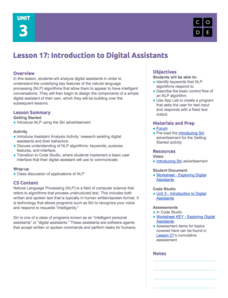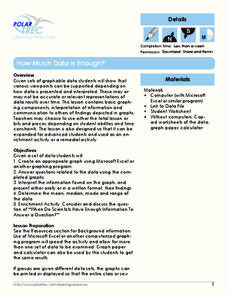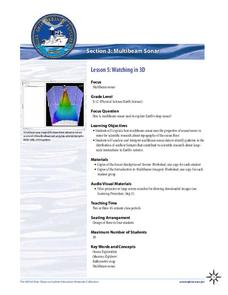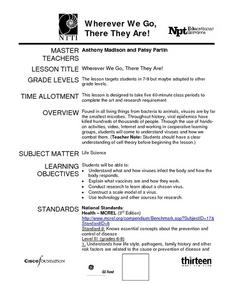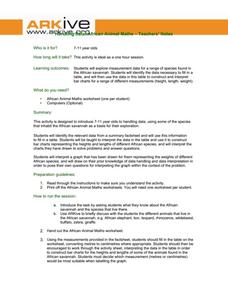Code.org
Introduction to Digital Assistant Project
How does a computer recognize voice commands? Scholars learn about digital assistants and natural language processing (NLP) algorithms in the ninth lesson of the series. They begin building a simple digital assistant and work on this...
Code.org
Image Scroller with Key Events
Discover how to embed images in lists. Scholars modify an existing app to include an image scroller in the 17th lesson of the series. They learn to refactor code and remove redundancies after modifying code.
Curated OER
Cartoons for the Classroom: The Climate Change Debate
Is global warming all smoke and mirrors? Find out what your scholars think with this handout, which has them analyzing two political cartoons on the topic. Background information gives context, detailing the computer hacking during the...
Chicago Botanic Garden
Calculating Your Ecological Footprint
You can lower your ecological footprint by recycling! Lesson four in this series of five has individuals, through the use of a computer, calculate their ecological footprints. Through discussions and analysis they determine how many...
Curated OER
Pen Pals
Students collect bird count data at their sites, and share and compare the data collected from two different schoolyards using computer technology.
Polar Trec
How Much Data is Enough?
The next time you read a magazine or watch the news, make note of how many graphs you see because they are everywhere! Here, scholars collect, enter, and graph data using computers. The graphs are then analyzed to aid in discussion of...
Science 4 Inquiry
Eukaryotic Cells: The Factories of Life
Eukaryotes include humans, animals, and plants. Scholars learn about the parts of eukaryotic cells. They design models of a store and match the correct function of each part to the function of a part of the cell. They review their...
Curated OER
Changing Planet: Sea Levels Rising
Begin by showing a six-minute video, Changing Planet: Rising Sea Level as an anticipatory set. Pupils draw a topographic map of a potato continent. Finally, they will visit NOAA's sea levels online map and NASA's carbon dioxide...
Curated OER
Growing Apples
Pupils complete various activities to investigate growing apples. They examine words related to apple growth and write the words on apple shapes. They also take a vocabulary quiz and complete an apple concentration game. Next, they watch...
Curated OER
Poetry Through Digital Storytelling
Bring digital storytelling to your language arts class! To begin, learners select their own topic, such as a poem that reflects a life experience they had or a historical figure who interests them. Then they work to create a storyboard...
NASA
Let's Investigate Mars
Take your science class on a hypothetical field trip to Mars with an engaging astronomy lesson. After first learning about NASA's Mars rover missions, young scientists plan their own scientific investigations of Earth's...
Curated OER
It's too loud!
Investigate soft, loud, and dangerous sounds. Little ones put a check next to the sounds that are loud, an X next to ones that are soft, and circle the ones that would require protective ear wear. Tip: Get out a tape player or computer...
NOAA
Watching in 3D
Bring the ocean floor to life! Earth science scholars discover the process of deep sea mapping in the third installment in a series of five lessons about ocean exploration. The teacher's guide includes helpful resources, worksheets, and...
University of California
Hot! Hot! Hot!
Calories are not tiny creatures that sew your clothes tighter every night, but what are they? A science lesson, presented at multiple levels, has learners experiment with heat, heat transfer, and graph the function over time....
Curated OER
Wherever We Go, There They Are!
The central video for this lesson is not available through the included resource link. However, the activity that simulates the passing of a virus through a population is impacting and the other resource links are invaluable. Use this...
Curated OER
The History of Life on Earth
Using meters as years, your class works together to map out the geologic time scale on a football field. Plenty of background information is included in this lesson plan as well as several resource links and a student worksheet. Your...
Curated OER
Penguins Around the World
Students investigate penguins. In this Science lesson, students compare and contrast penguins to flying birds. Students use a Venn diagram to illustrate the differences and similarities of penguins and flying birds.
ARKive
Handling Data: African Animal Maths
Handling and processing data is a big part of what real scientists do. Provide a way for your learners to explore graphs and data related to the animals that live on the African savannah. They begin their analysis by discussing what they...
Code.org
Introduction to Data
Data, data everywhere. Challenge your class to begin thinking about data, the ways people collect information, and what we can learn from this data. Class members discuss sources of data and then individuals answer questions in the...
Alabama Learning Exchange
Float or Sink?
Experiment with mass and density as scholars figure out what makes things float or sink. First, they watch a podcast introducing these concepts. Be sure to use the comprehension question to test their understanding. Young scientists...
Physics Classroom
Action-Reaction Lab
Computer-interfaced motion detectors are required to carry out this inquiry. It is a new twist on exploring motion with plunger carts: they are set back-to-back and then propelled away from each other. Their velocities are measured, and...
Curated OER
Energy Resources: Where Are They and How Do We Get Them?
Future energy engineers visit several stations, each one dedicated to a different alternative source of energy. They describe how solar energy is converted into other forms of energy, the patterns of distribution of energy resources in...
Curated OER
Parts of a Plant
First graders discover the parts of a plant. In this science lesson, 1st graders identify and label the parts of a plant and record their findings on a word processor.
Curated OER
I'm Gone
Young scholars plan a mock mission to Mars. In this space science lesson, students work in cooperative groups and select one experiment to take on their mock mission. Young scholars create a mission plan form and send a proposed...
Other popular searches
- Computer Science Excel
- Computer Science Java
- B Ed Computer Science
- History of Computer Science
- Computer Science History
- Computer Science Worksheets
- Networking Computer Science
- Computer Science C Programs
- Computer Science C++programs
- Computer Science Engineering
- Science and Computer Science
- Computer Science Terms
